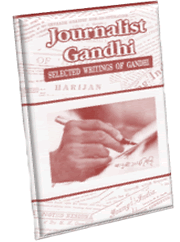
P.O. SEVAGRAM, DIST.WARDHA 442102, MS, INDIA. Phone: 91-7152-284753
FOUNDED BY MAHATMA GANDHI IN 1936
JOURNALIST GANDHI
Selected Writings of Gandhi

JOURNALIST GANDHI
(Selected Writings of Gandhi)
Table of Contents
- ON DEMOCRACY
- ON COMMUNALISM
- ON UNTOUCHABILITY
- ON MORALITY
- ON CASTE
- ON WOMEN
- ON HIS OWN LIFE
- ON RELIGION
- ON SWADESHI
- ON SOCIALIST
- ON CAPITALISM
- ON NON-VIOLENCE
- ON STUDENTS
- ON HIS SON
- ON SOCIAL SERVICE
- ON POLITICS
About This Book
Compiled by : T. K. Somaiya
Gandhi Book Center,
Bombay Sarvodaya Mandal,
299, Tardeo Road,
Nana Chowk, Mumbai 400 007
First Edition : August 1994
Published by : Jitendra T. Desai,
Navajivan Publishing House,
Ahemadabad - 380 014,
India
Printed by : Yash Printers
140/L, Kalbadevi Road,
Mumbai 400 002
India
Download
ON SOCIALIST
Chapter 20: Duty of Bread Labour
Brahma created His people with the duty of sacrifice laid upon them and said, 'By this do you flourish. Let it be the fulfiller of all your desires.'...He who eats without performing this sacrifice eats stolen bread,"- thus says the Gita. 'Earn thy bread by the sweat of thy brow,' says the Bible. Sacrifices may be of many kinds. One of them may well be bread labour. If all laboured for their bread and no more, there would be enough food and enough leisure for all. Then there would be no cry of over-population, no disease, and no such misery as we see around. Such labour will be the highest form of sacrifice. Men will no doubt do many other things either through their bodies or through their minds, but all this will be labour of love, for the common good. There will then be no rich and no poor, none high and none low, no touchable and no untouchable.
This may be an unattainable ideal. But we need not, therefore, cease to strive for it. Even if without fulfilling the whole law of sacrifice, that is, the law of our being, we performed physical labour enough for our daily bread, we should go a long way towards the ideal.
If we did so, our wants would be minimized, our food would be simple. We should then eat to live, not live to eat. Let anyone who doubts the accuracy of this proposition try to sweat for his bread, he will derive the greatest relish from the productions of his labour, improve his health and discover that many things he took were superfluities.
May not men earn their bread by intellectual labour? No. The needs of the body must be supplied by the body. "Render unto Ceaser that which is Cesar's" perhaps applies here well.
Mere mental, that is intellectual labour is for the soul and is its own satisfaction. It should never demand payment. In the ideal state, doctors, lawyers and the like will work solely for the benefit of society, not for self. Obedience to the law of bread labour will bring about a silent revolution in the structure of society. Man's triumph will consist in substituting the struggle for existence by the struggle for mutual service. The law of the brute will be replaced by the law of man.
Return to the village means a definite voluntary recognition of the duty of bread labour and all it connotes. But says the critic, "millions of India's children are today living in the villages and yet they are living a life of semi-starvation." This, alas, is but too true. Fortunately we know that theirs is not voluntary obedience. They would perhaps shirk body labour if they could, and even rush to the nearest city if they could be accommodated in it. Compulsory obedience to a master is state of slavery, willing obedience to one's father is the glory of sonship. Similarly, compulsory obedience to the law of bread labour breeds poverty, disease and discontent. It is a state of slavery. Willing obedience to it must bring contentment and health. And it is health which is real wealth, not pieces of silver and gold. The Village Industries Association is an experiment in willing bread labour.
Harijan 29-6-1935